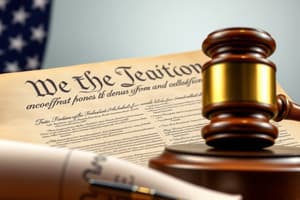Podcast
Questions and Answers
Which of these principles is NOT one of the four universal principles of the rule of law?
Which of these principles is NOT one of the four universal principles of the rule of law?
- Public Safety (correct)
- Open Government
- Just Law
- Accountability
What is the concept of 'jury nullification'?
What is the concept of 'jury nullification'?
- When a jury is dismissed due to bias or misconduct
- When a jury reaches a verdict despite overwhelming evidence to the contrary (correct)
- When a jury is unable to reach a unanimous decision
- When a jury is given special instructions by the judge
What is the key difference between 'prior restraint' and 'post-publication punishment'?
What is the key difference between 'prior restraint' and 'post-publication punishment'?
- Prior restraint is a legal concept, while post-publication punishment is a social norm.
- Prior restraint occurs before publication, while post-publication punishment occurs after publication. (correct)
- Prior restraint applies to speech, while post-publication punishment applies to actions.
- Prior restraint is used by the government, while post-publication punishment is used by private individuals.
What is an example of a 'positive right' in the context of the First Amendment?
What is an example of a 'positive right' in the context of the First Amendment?
Which of these is NOT a benefit of a strong rule of law?
Which of these is NOT a benefit of a strong rule of law?
What is the primary reason why the U.S. system of freedom of expression is considered 'exceptional'?
What is the primary reason why the U.S. system of freedom of expression is considered 'exceptional'?
Which of these theories of free expression primarily focuses on the individual's right to self-fulfillment?
Which of these theories of free expression primarily focuses on the individual's right to self-fulfillment?
The 'Fourth Estate' refers to which group?
The 'Fourth Estate' refers to which group?
What is the significance of the 'Statute of Anne' in the history of freedom of expression?
What is the significance of the 'Statute of Anne' in the history of freedom of expression?
What is the main reason why Scandinavian countries have high levels of rule of law?
What is the main reason why Scandinavian countries have high levels of rule of law?
What is the key takeaway from the case of John Peter Zenger?
What is the key takeaway from the case of John Peter Zenger?
Which of these statements BEST reflects the U.S. approach to setting up rights?
Which of these statements BEST reflects the U.S. approach to setting up rights?
Which of these is an example of an absolute right?
Which of these is an example of an absolute right?
What is the main reason why freedom of expression is important in a democratic society?
What is the main reason why freedom of expression is important in a democratic society?
The decision in the case of Snyder v. Phelps (2011) ultimately dealt with which legal principle?
The decision in the case of Snyder v. Phelps (2011) ultimately dealt with which legal principle?
Which of the following BEST describes the role of the 'marketplace of ideas' in a democratic society?
Which of the following BEST describes the role of the 'marketplace of ideas' in a democratic society?
Which of these is NOT a source of law in the United States?
Which of these is NOT a source of law in the United States?
What does the "stare decisis" principle refer to?
What does the "stare decisis" principle refer to?
In the case citation "Snyder v. Phelps, 562 U.S. 443 (2011)", what does the "562 U.S." indicate?
In the case citation "Snyder v. Phelps, 562 U.S. 443 (2011)", what does the "562 U.S." indicate?
What is a 'dissent' in a court opinion?
What is a 'dissent' in a court opinion?
What is the significance of the case "Snyder v. Phelps"?
What is the significance of the case "Snyder v. Phelps"?
Flashcards
Sources of law
Sources of law
Various origins that create legal rules in a society.
Common law
Common law
Law derived from court opinions and precedents.
Chevron deference
Chevron deference
Judicial principle where courts defer to agency interpretations of law.
Stare decisis
Stare decisis
Signup and view all the flashcards
Dissent
Dissent
Signup and view all the flashcards
Phelps v. Snyder
Phelps v. Snyder
Signup and view all the flashcards
Rule of Law
Rule of Law
Signup and view all the flashcards
Four Universal Principles
Four Universal Principles
Signup and view all the flashcards
Accountability in Government
Accountability in Government
Signup and view all the flashcards
Just Law
Just Law
Signup and view all the flashcards
Open Government
Open Government
Signup and view all the flashcards
Impartial Justice
Impartial Justice
Signup and view all the flashcards
Benefits of High Rule of Law
Benefits of High Rule of Law
Signup and view all the flashcards
Seditious Libel
Seditious Libel
Signup and view all the flashcards
Jury Nullification
Jury Nullification
Signup and view all the flashcards
Prior Restraint
Prior Restraint
Signup and view all the flashcards
First Amendment Exceptionalism
First Amendment Exceptionalism
Signup and view all the flashcards
Positive Rights
Positive Rights
Signup and view all the flashcards
Negative Rights
Negative Rights
Signup and view all the flashcards
Marketplace of Ideas
Marketplace of Ideas
Signup and view all the flashcards
Study Notes
Sources of Law
- Multiple sources structure societies
- The US uses six: constitutions, statutory law, common law, law of equity, administrative rules & regulations, and religious/customary law
- Constitutions establish government structure and are the ultimate source of law
- Statutory law is made by legislative bodies (e.g., Congress)
- Common law consists of court opinions, creating precedent (Stare Decisis)
- Law of equity allows courts to order specific performance or injunctions when monetary remedies are insufficient
- Administrative rules/regulations are made by the executive branch, often with deference from courts (though this "Chevron deference" is now overturned)
- Religious/customary law may apply on tribal lands/reservations.
Reading the Law
- US Constitution and state constitutions are fundamental
- Common law is based on court opinions (e.g., Snyder v. Phelps)
- Case citations (e.g., 562 U.S. 443 (2011)) indicate the volume, reporter, page number, and year of the case
- Civil cases are typically plaintiff v. defendant
Snyder v. Phelps (2011)
- The court's opinion impacts legal interpretation.
- The case involves emotional distress after protests by the Westboro Baptist Church.
- The First Amendment protects hate speech in certain contexts.
Picking out Key Elements in a Legal Opinion
- Case citation identifies the parties and location.
- The author of the opinion is crucial.
- Understand how the justices voted (concurrence or dissent).
- Procedural history details the case's path through the courts.
- Facts presented are critical to the opinion.
- The ruling (disposition) is a significant element.
Rule of Law
- Strong rule of law improves economic stability, increases peace, enhances education, and promotes a responsible government and increased life expectancy.
Four Universal Principles of Rule of Law
- Accountability: Holding officials accountable for corruption and wrongdoing, regardless of status.
- Just Law: A clear, accessible, stable, and equally applied legal system safeguarding fundamental rights.
- Open Government: Transparent government actions, citizen collaboration, and timely responses to queries.
- Accessible & impartial justice: Affordable, timely, corruption-free dispute resolution with neutral and independent decision-makers.
Scandinavian Countries
- Homogeneous populations present unique societal challenges in immigration.
- High taxes fund comprehensive social services (healthcare, food assistance).
- Limited armed law enforcement.
Our English Roots
- English law influenced the US, including seditious libel laws (criticizing the government).
- John Peter Zenger's trial challenged these laws in the American colonies.
- Jury nullification is a notable aspect of the trial.
- The Stamp Act exemplifies the negative impact of newspaper taxes.
- Prior restraint (government censorship) is opposed. Post-publication punishment (legal action) plays a role.
First Amendment Exceptionalism
- US distinguishes itself with a different approach to free speech compared to other countries.
Justifying Free Expression in a Democratic Society
- Positive rights: The government ensures citizens can participate in things.
- Negative rights: Government limitations on restricting activities
- Absolute rights: Absolute protection of all speech regardless of content.
- Free expression is crucial for critical evaluation of government, self-fulfillment, and diverse ideas.
Free Expression Theories
- Self-fulfillment: The value of expression in self-discovery
- Marketplace of ideas: The free exchange of ideas to foster truth discovery
- Counter-access theory: Evaluating the influence of different voices
- Safety valve/dissent: Providing a safe outlet for discontent
- Self-governance: Expression enhances decision-making in a democracy
- Checking/watchdog value: Surveillance of government by the press
- Fourth Estate: The press as a check on government
Studying That Suits You
Use AI to generate personalized quizzes and flashcards to suit your learning preferences.




